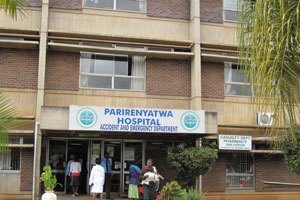
BY EVERSON MUSHAVA/PHYLLIS MBANJE
Claims by government that public health institutions have the capacity to handle all Covid-19 cases in the country and that they were also equipped to conduct mass screening, including testing for the virus, are not true, health workers who spoke to The Standard yesterday said.
Government last week urged people to go and receive Covid-19 treatment at public hospitals, saying it was not necessary for the pubic to pay huge sums of money at private health institutions for services that could be provided at government institutions. The government said its hospitals were sufficiently equipped to treat and test for the coronavirus.
The government’s statement was in apparent response to a story ran by The Standard on how people seeking Covid-19 treatment were paying exorbitant fees in foreign currency at both private and public hospitals on admission.
The Zimbabwe Nurses’ Association president Enoch Dongo said government was misrepresenting facts, adding that in fact the situation in public hospitals remained gloomy.
“It is unfortunate that the government chooses to lie to its people. That is not a right thing to do,” Dongo said.
“Facts should be recorded correctly for the president to be aware and to make the right decisions. As we speak, urging people to report to public hospitals where health workers don’t have adequate personal protective equipment and other resources would be to mislead them.
“We are in the midst of a pandemic and blame games and lying will not work.”
- Chamisa under fire over US$120K donation
- Mavhunga puts DeMbare into Chibuku quarterfinals
- Pension funds bet on Cabora Bassa oilfields
- Councils defy govt fire tender directive
Keep Reading
Health practitioners who spoke to The Standard said Covid-19 testing in public hospitals was limited only to suspected cases and symptomatic patients only, not everyone. They expressed concern over high numbers of new infections and Covid-19-related deaths, despite the low testing at the public hospitals.
“Isolation centres are full, oxygen is in high demand and short supply while people are scrambling for hospital beds. Testing is free, but we only test suspected cases and contacts,” one health worker said.
“Health workers are also a priority for testing. Though the RT-PCR remains the gold standard for diagnosis of Covid-19, most hospitals are currently using antigen rapid diagnostic testing which takes 15 to 30 minutes to give results. The turnaround time for results is somewhat fast.”
Another health worker said: “What is happening at most public hospitals is that we are overwhelmed by the huge numbers of people coming for treatment. The situation is made worse by the fact that a big number of staff members are not at work, having gone into quarantine at home after being exposed to the virus. Most hospitals are not operating with the full complement of staff, and can’t handle any numbers beyond what we get every day.”
The Health Services Board last week disclosed that over 1 500 health workers had tested positive to the virus and eight had since died.
Christopher Pasi, clinical director at Sally Mugabe Central Hospital, said the hospital had designated isolation areas for persons under investigation for Covid-19.
“During the second and third week of January 2021, these areas were almost always 90-100% full as the second wave hit the system very hard,” Pasi said.
“The situation has improved now to about 50-70% occupancy as the numbers presenting for care are coming down in addition to improved capacity at Parirenyatwa, Wilkins and BRIDH [Beatrice Road Infectious Diseases Hospital] to take transfers from our units.”
He added: “We have organised specialists at the hospital to work as teams with the nurses to manage some of the patients effectively, medically and surgically and discharge those that are able to be managed from home.
“We have also identified additional areas to isolate patients under investigation if the current space becomes overwhelmed.”
Health deputy minister John Mangwiro and Health secretary Jasper Chimedza were not picking calls yesterday.










